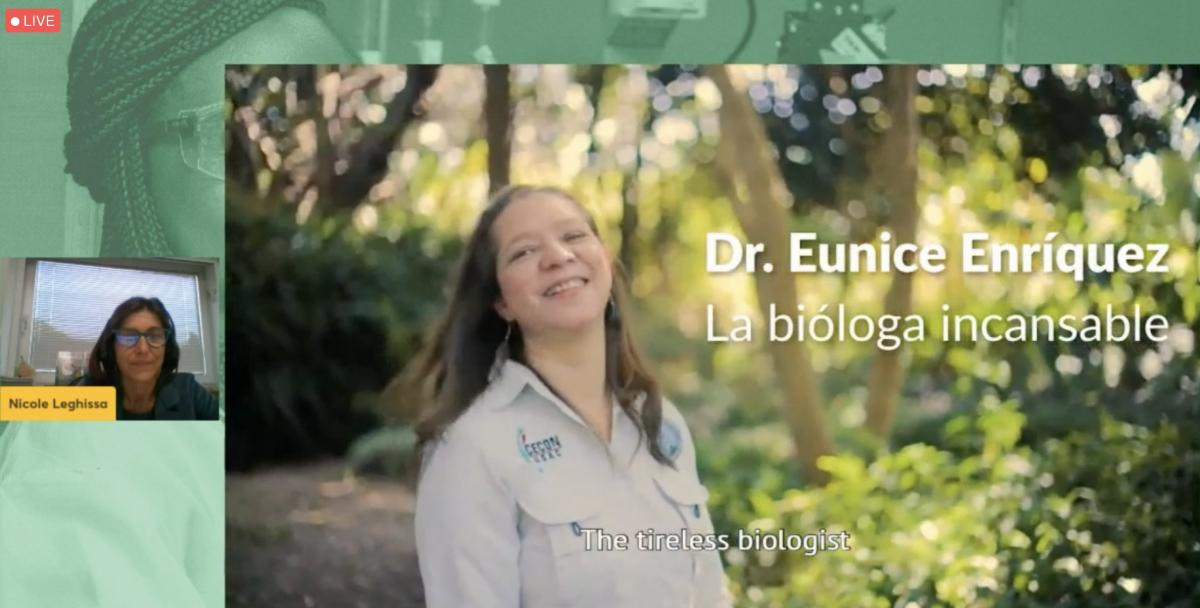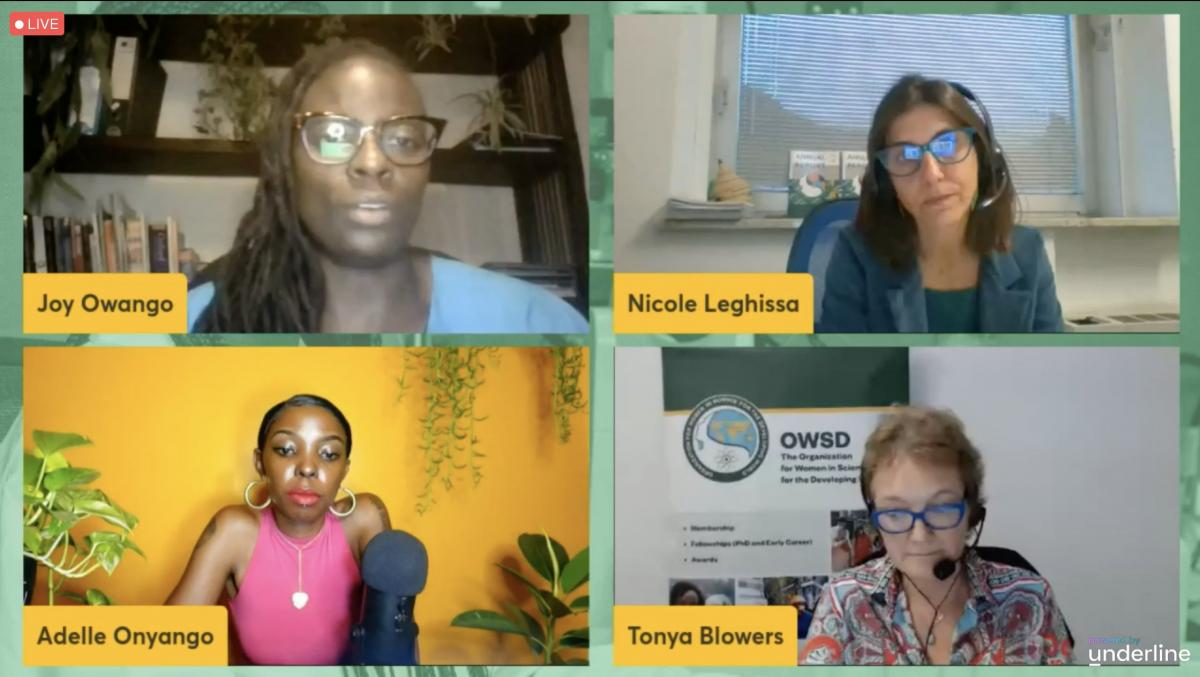OWSD General Assembly Day 5: Scientists explore storytelling to make science visible, relatable
November 26, 2021
To close out the first week of the OWSD 6th General Assembly and International Conference, OWSD’s global network of women scientists learned how to use podcasting and film to bring audiences to their research. During two workshops held on Friday, November 12, scientists learned what makes a compelling science story, how to connect with audiences, and how to make a podcast sustainable.
Joy Owango, Executive Director of the Training Centre in Communication (TCC Africa), spoke highly of podcasting as a means of allowing scientists to build a community around their work. “Podcasts are effective," she said. "They are portable, they are extremely convenient and they are an intimate way to build ongoing relationships with your community... You can influence change based on the work you are doing.” She added that podcasts allow scientists to be in control of the narrative around their subject matter. Joy then introduced Adelle Onyango, the facilitator of the podcasting workshop.
Adelle, a seasoned, internationally recognised podcaster based in Kenya gave practical and actionable advice during the workshop. She taught the audience to make sure their podcasts address a real need and are filling a gap. She recommended specific microphones and open-access audio editing software that podcasters can use, such as the mobile phone-based Anchor and Audacity. She also discussed how to distribute a podcast on multiple platforms, including Soundcloud, Stitcher, Google Podcasts and more. She advised podcast creators to develop at least 12 months’ worth of content by focusing on the scientific work that they are most passionate about. She also advised podcasters to define their target audiences in detail and to always keep that audience in mind when creating episodes. She advised podcasters to manage their costs so that they can produce episodes consistently. Inconsistency, Adelle said, makes audiences lose interest. She suggested ways scientists can monetise their podcasts. Adelle shared that her own podcast, Legally Clueless, makes revenue through advertising.
Adelle concluded her workshop by urging would-be podcasters to use storytelling to humanise science and STEM and demonstrate their relevance in everyday life. “It’s all about creating an emotional connection between your audience and your [scientific work] … What hormone do you want leave your audience with?” she said. Adelle added that it was important to make the podcast feel very personal. Adelle emphasised that girls need to hear women scientists telling their stories so that they, too, can see science as a viable career option for themselves. She urged podcasters never to overdramatise the stories they have recorded in order to create shock value. Instead, Adelle advised, create an atmosphere in the recording environment that will make guests feel safe enough to open up and tell a genuine story. “A good story inspires action or introspection… a good story takes the audience on a journey and leaves them with something they didn’t know before.”
Telling science stories through filmmaking
 Documentary filmmaker Nicole Leghissa, the producer of the OWSD Visions film series, took the stage next and described her work of making films about OWSD scientists working in developing countries. Nicole has made films in Bolivia, Kenya, Senegal, Benin and other countries. She described the experience of getting the OWSD Visions project off the ground during the COVID-19 pandemic, when she had the idea to work with filmmakers at long distance via WhatsApp calls and Zoom to help them conceputalize, record, and edit short films profiling local women scientists. Every film follows the traditional narrative arc, she said – it introduces the protagonist, describes the problem the scientist has encountered and the solution the scientist has come up with. Nicole said she likes to show a scientist’s personal side, as in the film of Prativa Pandey, a science entrepreneur and researcher based in Nepal. Prativa is shown in the film at home with her husband and daughter. Nicole showed several films she made of Dina Machuve, an early career fellow and lecturer at the Nelson Mandela African Institute of Science and Technology in Tanzania, Eunice Enriquez from Guatemala and Patricia Castillio-Briceno from Ecuador.
Documentary filmmaker Nicole Leghissa, the producer of the OWSD Visions film series, took the stage next and described her work of making films about OWSD scientists working in developing countries. Nicole has made films in Bolivia, Kenya, Senegal, Benin and other countries. She described the experience of getting the OWSD Visions project off the ground during the COVID-19 pandemic, when she had the idea to work with filmmakers at long distance via WhatsApp calls and Zoom to help them conceputalize, record, and edit short films profiling local women scientists. Every film follows the traditional narrative arc, she said – it introduces the protagonist, describes the problem the scientist has encountered and the solution the scientist has come up with. Nicole said she likes to show a scientist’s personal side, as in the film of Prativa Pandey, a science entrepreneur and researcher based in Nepal. Prativa is shown in the film at home with her husband and daughter. Nicole showed several films she made of Dina Machuve, an early career fellow and lecturer at the Nelson Mandela African Institute of Science and Technology in Tanzania, Eunice Enriquez from Guatemala and Patricia Castillio-Briceno from Ecuador.
Panel discussion: Telling science stories
 The panel discussion following the two workshops explored using autobiographies as a means of telling stories about scientists. The panel was moderated by Joy Owango and it featured Nicole Leghissa, Adelle Onyango and OWSD Coordinator Tonya Blowers. Tonya shared that the starting point and the end point of an autobiography will affect the structure of the autobiography and will bring out different questions from readers. The writer’s conceptual framework is also key to how they tell their story, Tonya said. A writer’s conceptual framework, context and cultural background are central to structuring an autobiography that resonates with its audience. Tonya said, “It is only the people who live in the context who know their stories the way they do. The way they tell their story will resonate with their audience.”
The panel discussion following the two workshops explored using autobiographies as a means of telling stories about scientists. The panel was moderated by Joy Owango and it featured Nicole Leghissa, Adelle Onyango and OWSD Coordinator Tonya Blowers. Tonya shared that the starting point and the end point of an autobiography will affect the structure of the autobiography and will bring out different questions from readers. The writer’s conceptual framework is also key to how they tell their story, Tonya said. A writer’s conceptual framework, context and cultural background are central to structuring an autobiography that resonates with its audience. Tonya said, “It is only the people who live in the context who know their stories the way they do. The way they tell their story will resonate with their audience.”
The panel discussion also raised interesting questions about decolonising storytelling by finding ways to empower women from the Global South to set the storytelling agenda. One way was the democratisation of storytelling tools, curation of stories, using social media to advertise the stories.











































